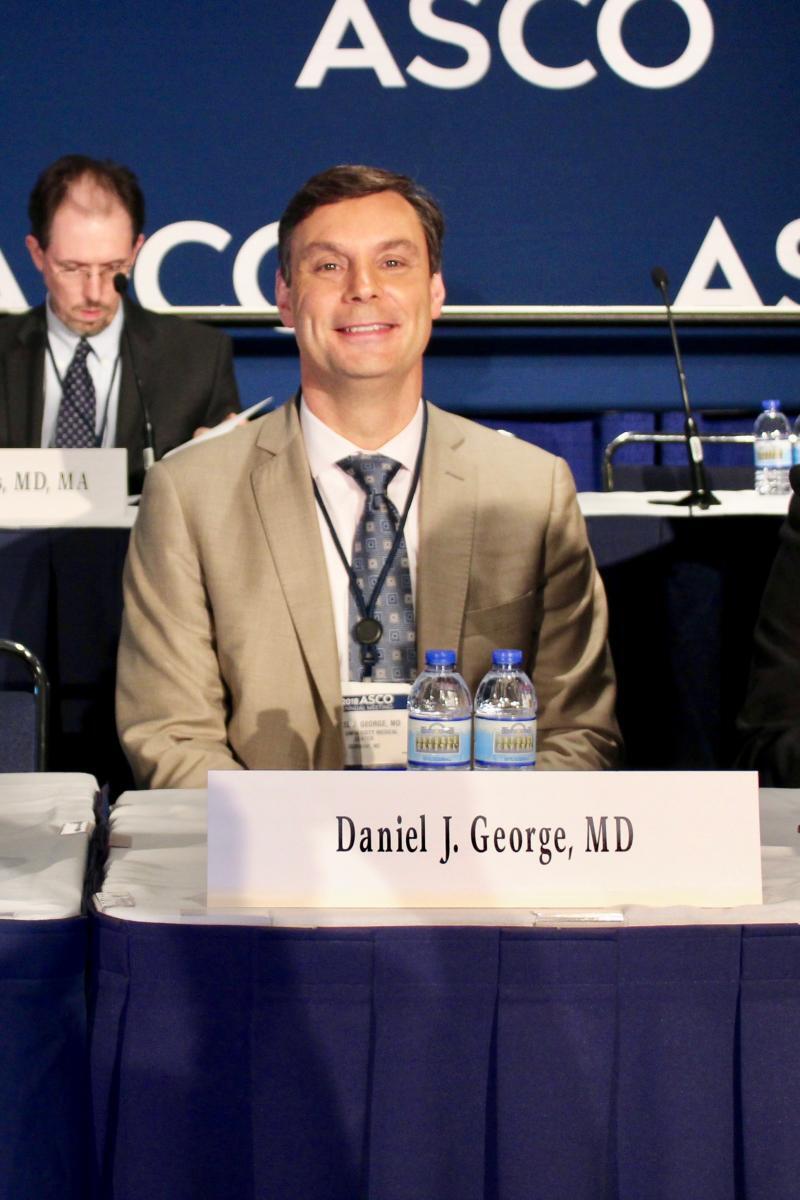
Daniel George, MD, Duke Cancer Institute professor and director of DCI’s Genitourinary Cancer program, has been named a Fellow of the American Society of Clinical Oncology (FASCO), ASCO announced last week in a press release introducing the 2021 FASCO class and presenting other special awards. Thomas Leblanc, MD, MA, MHS, FAAHPM, DCI clinical hematologic malignancies specialist and palliative care physician, was also named a Fellow of ASCO (READ).
The FASCO distinction recognizes ASCO members for their extraordinary volunteer service, dedication, and commitment to ASCO.
George, who co-leads the DCI Center for Prostate and Urologic Cancers and the Patierno/George/Freedman Lab for Cancer Research, is an internationally recognized clinical oncologist, researcher and thought leader in genitourinary malignancies — specializing in kidney cancer and prostate cancer. His areas of research include improved treatment modalities, the development of new drugs, and the identification of biomarkers in GU cancers with an emphasis on the biological drivers of cancer disparities. He’s the author of more than 200 peer-reviewed publications, including several reviews and position papers on GU cancer disparities.
George is a tenured professor (since 2015) in the Department of Medicine, Division of Medical Oncology, with a secondary appointment in the Department of Surgery, Division of Urology, at the Duke University School of Medicine. He received both his BS (1988) and his MD (1992) at Duke and did his residency and fellowship at Johns Hopkins Hospital. George joined the DCI faculty in 2003 from Harvard University Medical School's Dana-Farber Cancer Institute, where he was an assistant professor in the Department of Medicine.
George has been a member of ASCO since 2003. His roles with ASCO have included serving on the Scientific Committee for the Genitourinary Cancer Symposium for three years; serving twice on the ASCO Scientific Program Committee (two three-year terms); serving one three-year term as leader of the Scientific Program Committee GU (Non-prostate) Cancer Track; and serving two three-year terms on the Conquer Cancer Foundation grants review committee, including one as chair. He has also, as a volunteer, led GU fellows on poster walks and has volunteered at mentorship luncheons.
Most recently (since 2019), George has been serving as a member of the ASCO Research Priorities Decision Group.
In addition to ASCO, George has served in a leadership or membership capacity in various other cancer-focused national committees and organizations, including serving on the NCI (National Cancer Institute) Renal Task Force (2012) and the NCI Genitourinary Cancers Steering Committee (2014).
George is currently the scientific leader for kidney cancer in the Alliance Cooperative Group (since 2011) and serves on Alliance’s GU scientific committee. He’s been a member of the Advisory Board of the Kidney Cancer Association since 2005, a member of the Scientific Oversight Committee of the Prostate Cancer Clinical Consortium since 2007, a member of the Society for Immunotherapy of Cancer Program RCC Cancer Immunotherapy Guideline Committee (SITC RCC CIG) since 2018, and a member of the American Association for Cancer Research (AACR) Cancer Health Disparities Research Scientific Review Committee since 2019.
In addition, he currently serves as senior editor for AACR’s journal, Clinical Cancer Research, and as co-editor in chief of Clinical Advances in Hematology and Oncology.




